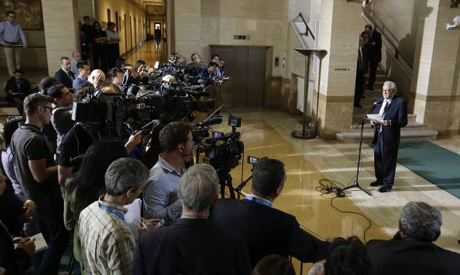
U.N.-Arab League envoy for Syria Lakhdar Brahimi addresses the media after a meeting on Syria at the United Nations European headquarters in Geneva June 5, 2013 (Photo: Reuters)
Western and Arab diplomats say a round of consultations is expected to take place in Europe, Washington and the Middle East over how to conclude a settlement to end the Syrian crisis.
"What we saw in Geneva yesterday during a meeting of the concerned parties was much disagreement: we saw parties who were supposed to set the ground for an agreement among Syrians while they were unable to amongst themselves decide the basis for a possible agreement," commented a Middle East diplomat who preferred to remain anonymous.
The Wednesday meeting in Geneva by the UN-Arab Envoy Lakhdar Librahimi and foreign ministers of key world capitals failed to agree on the principals required for what is called the Geneva II meeting, which should follow up on the basic resolution guidelines concluded in the Geneva I meeting last summer.
The Geneva I meeting essentially proposed the establishment of an administrative government that should have full control over all executive authorities pending subsequent presidential elections. The Geneva II is expected to look into the details of the composition of this government, amid the many factors of a wide and fragmented Syrian opposition and independent state institutional figures. In these talks there is no role for Syrian President Bashar Assad and his immediate clique.
Such were the many disagreements during the Wednesday meeting, however, that the tentative late June timeframe for Geneva II was pushed to the following month.
The basic dividing point there, according to informed Arab and Western diplomats, is the fate of the Syrian president and the representation of Syrian opposition figures. While some key Western capitals support the demand put by the Syrian National Coalition for a clear stipulation of the end of Assad's role in Syria, Moscow is not willing to agree to this prior to the convocation of the meeting.
Another disagreement between Moscow and the concerned Western capitals are the shares to be granted to the many Syrian opposition groups – with Moscow more inclined to give wider space to the liberal and Leftist opposition than what the Western-supported Islamist opposition would agree to.
Diplomats close to the Geneva meeting say that the fact that Assad, with Hezbollah's support, has been gaining ground in battles is making Moscow more inclined to stick to its position, especially since it fears if Assad were to exit the stage that the West might introduce a new regime that would be fully in line with its interests and neglect of Russia's.
According to American University in Cairo Political Science Professor Kazziha, the likely perpetuation of the conflict in Syria is not just about the disagreement among key world players over the country's fate, but also about the interests of some in Syria. Kazziha claims he has recently heard the complaints of some key Syrian opposition figures, including Syrian National Council's Moaz ElKhatib about the "keen interest of some to keep the war going in order to also keep the funds channelled from Qatar and Saudi Arabia coming."
Speaking at an AUC roundtable on developments in Syria as international and regional diplomats were meeting in Geneva Wednesday, Kazziha warned that the negatives of the perpetuation of the two-year-plus-long Syrian crisis are not just a bloody toll on its people and instability, but also that it has sparked an unsolicited regional confrontation between Sunnis and Shias where Arab Gulf countries ruled by Sunni monarchies support the now militarised opposition and Iran and Hezbollah actively fighting alongside the Syrian regime.
"In Syria today we have two wars entwined – the one of the Syrian regime and its opposition and the regional one fought by proxy in Syria," Kazziha explained, adding: "Obviously, Israel could not have wished for better, since these two wars are keeping it free from many political and other worries – including criticism of what it does to Palestinians. Nobody is talking about the Palestinian cause anymore."
For her part, AUC professor and expert on refugee matters, Shaden Khallaf warned of growing humanitarian tragedies with at least 1,600,000 refugees scattered around neighbouring countries. "This is the number of registered refugees up until May. We don’t have a count for [late] May and we don’t know the exact real figure," she said.
The tragedy of the refugees varies depending on whether had savings to count on while fleeing their country and whether they could find jobs to keep them going pending the aspired repatriation. Refugees can either be repatriated voluntarily (though that does not guarantee to their old homes). be integrated into the countries they took refuge in or into other countries, often the US, Latin America and Europe.
"More often than not there are so many refugees who don’t have any savings and don’t have much luck to start a job in order to provide for their families, especially those who end up in countries with tough economic challenges, like Egypt," Khallaf said.
Speaking at the same seminar with Kazziha, Khallaf shared the apprehension over the likelihood of an around-the-corner deal on Syria, which would drag out refugees' misery. She argued that given that the settlement is going to take longer and that a political settlement would not necessarily allow for sufficient stabilisation for refugees to return to Syria "a keen effort has to be invested in providing for and helping the refugee children; it is those children who should be able one day to go back to Syria and help rebuild the country."
Short link: